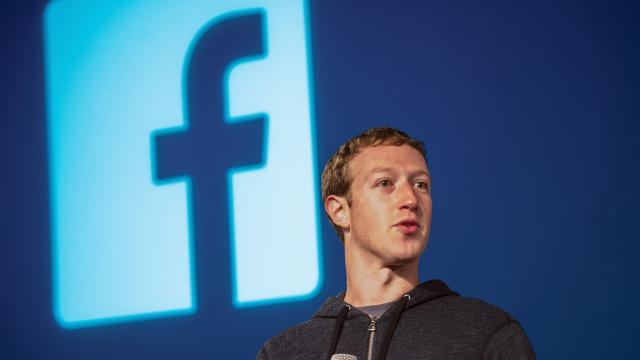As if we needed a reminder of how intertwined Facebook and politics are in 2016, a new report citing top US election officials says that the social media company contributed to substantial increases in voter registration throughout the US during a brief drive on the site last month. This is hardly the first time Facebook has gotten involved with politics. Indeed, Facebook’s potential impact on elections is becoming more apparent than ever.
Image: Getty
The New York Times reports that nine US secretaries of state (from California, Colorado, Connecticut, Georgia, Indiana, Kentucky, Minnesota, Nebraska and West Virginia) credited Facebook’s voter registration reminder — shown for four days in September — with boosting registration by considerable amounts. Nine other states found data that showed voter registration rose dramatically on the first day of Facebook’s campaign, compared to the days preceding. Officials are calling it “the Facebook Bump”.
Facebook’s ability to use its products to influence voter behaviour shouldn’t be a surprise to anyone. In 2010, the company tampered with news feeds in a 61-million-person experiment to see how Facebook could impact the voting behaviour of millions of people. An academic paper was published about the secret experiment in Nature, claiming that Facebook increased voter turnout by more than 340,000 people (enough to have a significant impact on the US election).
Facebook also ran secret experiments during the 2012 presidential election, between Barack Obama and Mitt Romney. More specifically, Facebook secretly meddled with 1.9 million user’s News Feeds. According to a Mother Jones report, Facebook tweaked the feeds so that news stories would show up at the top of the feed if a friend had shared a news story. Normally, people would see something personal at the top of the feed, like wedding photos.
That small tweak proved to have measurable effects on the election. The secret experiment showed that Facebook could increase the amount of attention people paid to government, and it supposedly even boosted voter turnout by three per cent, a huge uptick for such a small tweak.
Increasing voter turnout is obviously a great thing for democracy, but it’s worth noting that Facebook’s user base is slightly skewed. Facebook could not provide demographic breakdowns of the users who registered, but according to a 2015 Pew Research study, the social network is more popular among female users than male users, and especially popular among younger people. Those demographics — women and younger adults — tend to vote for Democrats.
Facebook has tried its best to downplay its influence in elections. For example, after the 2012 experiment, the company removed a YouTube video of a lecture about one of its secret experiments. (The video was later re-uploaded by reporter Micah Sifry.) The social network sponsored both the Republican and Democratic conventions this winter, providing both with financial backing, a Facebook Lounge and other assets. However, Facebook has also officially claimed that it does not try to influence how people vote.
The truth is a little more complicated. As Gizmodo previously reported, employees at Facebook have openly discussed how they might impact the election. In April, an internal poll was leaked to Gizmodo showing a Facebook employee asking Mark Zuckerberg, “What responsibility does Facebook have to help prevent President Trump in 2017?”
Gizmodo was unable to obtain Zuckerberg’s answer to the question, and Facebook declined to comment on whether it was ever answered.
In May, Gizmodo reported that Facebook news curators admitted that personal bias was allowed to influence the Trending Topics feed in the upper-right corner of the homepage. One of the former curators (out of the dozen we spoke to) kept a list of conservative keywords that had been suppressed by other curators, meaning related stories would be prevented from trending. Eventually, Facebook fired its entire trending news curator team.
